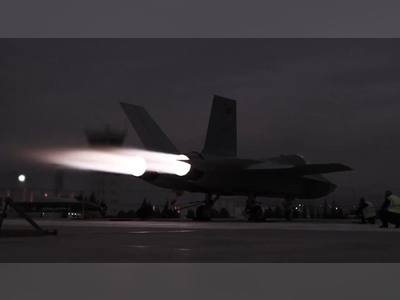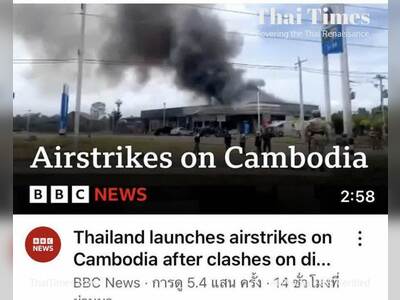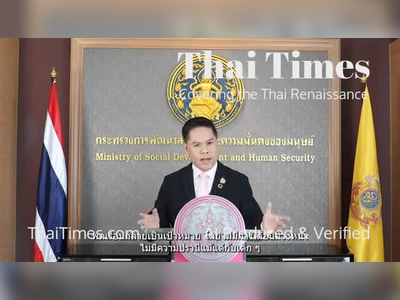
U.S.-Thailand Nuclear Partnership Agreement: A Strategic Move for Peaceful Energy Advancement
The U.S. and Thailand are enhancing nuclear energy collaboration through a new agreement, emphasizing regional security, energy requirements, and non-proliferation issues.
On January 10, 2025, President Joe Biden made a crucial decision regarding the proposed Cooperation Agreement Between the United States and Thailand on the peaceful use of nuclear energy.
This pact represents an important step in enhancing the bilateral ties between the two countries, addressing increasing energy demands, and strengthening non-proliferation efforts in Southeast Asia.
Agreement Background and Purpose
Authorized by the Atomic Energy Act of 1954, the agreement creates a framework for U.S.-Thailand collaboration in the nuclear energy sector.
Thailand has long aimed to develop a peaceful nuclear energy program to diversify its energy sources, lessen reliance on fossil fuels, and reduce the environmental impact of traditional energy systems.
The U.S. has supported countries pursuing nuclear technology for peaceful objectives under strict safeguards to maintain non-proliferation.
This agreement facilitates the exchange of nuclear technology, know-how, and materials for peaceful purposes like energy generation.
It seeks to enhance U.S.-Thailand cooperation in nuclear safety, regulation, and research, while reinforcing a mutual commitment to non-proliferation values.
In line with similar agreements the U.S. has with other nations, it aligns with a broader strategy to advance peaceful nuclear energy use while minimizing weapons proliferation risks.
The U.S. Perspective: Non-Proliferation and Security
From the U.S. perspective, the agreement underscores the significance of promoting nuclear energy while ensuring international security and adherence to the non-proliferation regime.
The U.S. has been a frontrunner in advocating for nuclear energy's peaceful application, and this agreement with Thailand follows that tradition.
The U.S. has stressed that this agreement's implementation doesn't pose an unreasonable risk to national or international security.
The Departments of Energy and State have worked closely with Thailand to establish a cooperation framework with robust safeguards.
These safeguards aim to prevent the diversion of nuclear materials for weaponization and to comply with International Atomic Energy Agency (IAEA) standards.
The agreement reinforces both nations' dedication to the global non-proliferation treaty (NPT) and highlights the importance of international collaboration in the safe use of nuclear technology.
As the U.S. furthers nuclear energy partnerships globally, this agreement exemplifies how such cooperation can expand without hindering non-proliferation objectives.
Thailand’s strategic position in Southeast Asia makes it central to a region increasingly focused on nuclear security and energy resilience.
Thailand’s Energy Goals and Regional Dynamics
For Thailand, this agreement is a crucial milestone in its quest for sustainable and clean energy solutions.
The country's growing population and industrial activities have led to rising energy needs.
Thailand's ambitious energy policy seeks a diversified energy production strategy, with nuclear energy expected to play a significant part in its long-term plans.
By 2036, Thailand intends for nuclear energy to contribute substantially to its energy mix, with nuclear power plants considered for the future grid.
This agreement aligns with Thailand's broader energy aims, including reducing greenhouse gas emissions, improving energy security, and ensuring a stable energy supply.
The peaceful use of nuclear energy is seen as a potential remedy for these challenges, especially as the country aims to reduce coal and natural gas imports.
Nonetheless, nuclear energy development in Thailand faces challenges.
Public opinion and safety and environmental concerns significantly influence energy policy decisions.
The Thai government must address these issues through effective regulations and public advocacy to secure wider support for nuclear initiatives.
Regional and Global Implications
The agreement carries significant regional and global repercussions.
Southeast Asia is increasingly focused on nuclear energy collaboration, with nations seeking to modernize their energy sectors while adhering to global non-proliferation standards.
The U.S.-Thailand agreement may serve as a model for other Southeast Asian countries looking to pursue peaceful nuclear energy in line with international security norms.
Moreover, the agreement strengthens U.S.-Thailand relations, which have traditionally been rooted in robust economic, political, and defense cooperation.
Thailand's strategic role in Southeast Asia and its partnership with the U.S. are vital for promoting stability and security in the Indo-Pacific region.
Nuclear energy cooperation adds another dimension to their collaboration, highlighting the depth and strength of their bilateral relationship.
Beyond fostering bilateral ties, the agreement could also contribute to regional energy stability.
By partnering with the U.S. on nuclear energy, Thailand could set a precedent for regional countries exploring nuclear energy in their transition strategies.
Thus, the agreement holds potential for broader regional cooperation in energy development, security, and non-proliferation.
The Path Forward
The signing and future implementation of the U.S.-Thailand nuclear cooperation agreement mark the onset of what could be a long-lasting and productive partnership.
The U.S. and Thailand must continue collaborating to ensure nuclear energy is developed safely, securely, and environmentally responsibly.
Both countries will face challenges, including technical and regulatory obstacles, necessitating strong oversight and open communication between governments and the public.
While the agreement could significantly boost Thailand's energy security and environmental goals, its success hinges on continued cooperation and a commitment to non-proliferation.
Next steps involve executing the agreement's frameworks, ensuring all necessary safety and regulatory measures are in place, and facilitating technology and expertise exchanges between the two nations.
As nuclear energy becomes more central in global energy discussions, the U.S.-Thailand agreement might serve as a benchmark for future international partnerships in the peaceful use of nuclear technology.
This pact represents an important step in enhancing the bilateral ties between the two countries, addressing increasing energy demands, and strengthening non-proliferation efforts in Southeast Asia.
Agreement Background and Purpose
Authorized by the Atomic Energy Act of 1954, the agreement creates a framework for U.S.-Thailand collaboration in the nuclear energy sector.
Thailand has long aimed to develop a peaceful nuclear energy program to diversify its energy sources, lessen reliance on fossil fuels, and reduce the environmental impact of traditional energy systems.
The U.S. has supported countries pursuing nuclear technology for peaceful objectives under strict safeguards to maintain non-proliferation.
This agreement facilitates the exchange of nuclear technology, know-how, and materials for peaceful purposes like energy generation.
It seeks to enhance U.S.-Thailand cooperation in nuclear safety, regulation, and research, while reinforcing a mutual commitment to non-proliferation values.
In line with similar agreements the U.S. has with other nations, it aligns with a broader strategy to advance peaceful nuclear energy use while minimizing weapons proliferation risks.
The U.S. Perspective: Non-Proliferation and Security
From the U.S. perspective, the agreement underscores the significance of promoting nuclear energy while ensuring international security and adherence to the non-proliferation regime.
The U.S. has been a frontrunner in advocating for nuclear energy's peaceful application, and this agreement with Thailand follows that tradition.
The U.S. has stressed that this agreement's implementation doesn't pose an unreasonable risk to national or international security.
The Departments of Energy and State have worked closely with Thailand to establish a cooperation framework with robust safeguards.
These safeguards aim to prevent the diversion of nuclear materials for weaponization and to comply with International Atomic Energy Agency (IAEA) standards.
The agreement reinforces both nations' dedication to the global non-proliferation treaty (NPT) and highlights the importance of international collaboration in the safe use of nuclear technology.
As the U.S. furthers nuclear energy partnerships globally, this agreement exemplifies how such cooperation can expand without hindering non-proliferation objectives.
Thailand’s strategic position in Southeast Asia makes it central to a region increasingly focused on nuclear security and energy resilience.
Thailand’s Energy Goals and Regional Dynamics
For Thailand, this agreement is a crucial milestone in its quest for sustainable and clean energy solutions.
The country's growing population and industrial activities have led to rising energy needs.
Thailand's ambitious energy policy seeks a diversified energy production strategy, with nuclear energy expected to play a significant part in its long-term plans.
By 2036, Thailand intends for nuclear energy to contribute substantially to its energy mix, with nuclear power plants considered for the future grid.
This agreement aligns with Thailand's broader energy aims, including reducing greenhouse gas emissions, improving energy security, and ensuring a stable energy supply.
The peaceful use of nuclear energy is seen as a potential remedy for these challenges, especially as the country aims to reduce coal and natural gas imports.
Nonetheless, nuclear energy development in Thailand faces challenges.
Public opinion and safety and environmental concerns significantly influence energy policy decisions.
The Thai government must address these issues through effective regulations and public advocacy to secure wider support for nuclear initiatives.
Regional and Global Implications
The agreement carries significant regional and global repercussions.
Southeast Asia is increasingly focused on nuclear energy collaboration, with nations seeking to modernize their energy sectors while adhering to global non-proliferation standards.
The U.S.-Thailand agreement may serve as a model for other Southeast Asian countries looking to pursue peaceful nuclear energy in line with international security norms.
Moreover, the agreement strengthens U.S.-Thailand relations, which have traditionally been rooted in robust economic, political, and defense cooperation.
Thailand's strategic role in Southeast Asia and its partnership with the U.S. are vital for promoting stability and security in the Indo-Pacific region.
Nuclear energy cooperation adds another dimension to their collaboration, highlighting the depth and strength of their bilateral relationship.
Beyond fostering bilateral ties, the agreement could also contribute to regional energy stability.
By partnering with the U.S. on nuclear energy, Thailand could set a precedent for regional countries exploring nuclear energy in their transition strategies.
Thus, the agreement holds potential for broader regional cooperation in energy development, security, and non-proliferation.
The Path Forward
The signing and future implementation of the U.S.-Thailand nuclear cooperation agreement mark the onset of what could be a long-lasting and productive partnership.
The U.S. and Thailand must continue collaborating to ensure nuclear energy is developed safely, securely, and environmentally responsibly.
Both countries will face challenges, including technical and regulatory obstacles, necessitating strong oversight and open communication between governments and the public.
While the agreement could significantly boost Thailand's energy security and environmental goals, its success hinges on continued cooperation and a commitment to non-proliferation.
Next steps involve executing the agreement's frameworks, ensuring all necessary safety and regulatory measures are in place, and facilitating technology and expertise exchanges between the two nations.
As nuclear energy becomes more central in global energy discussions, the U.S.-Thailand agreement might serve as a benchmark for future international partnerships in the peaceful use of nuclear technology.











